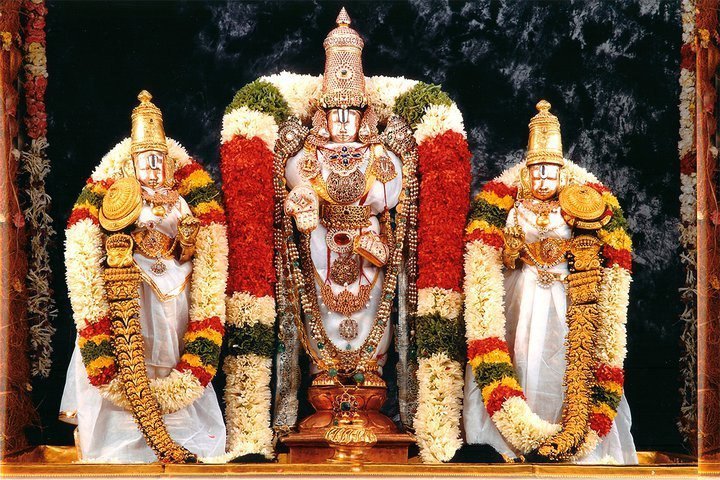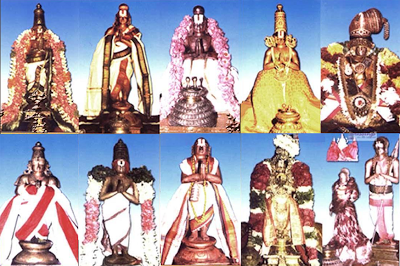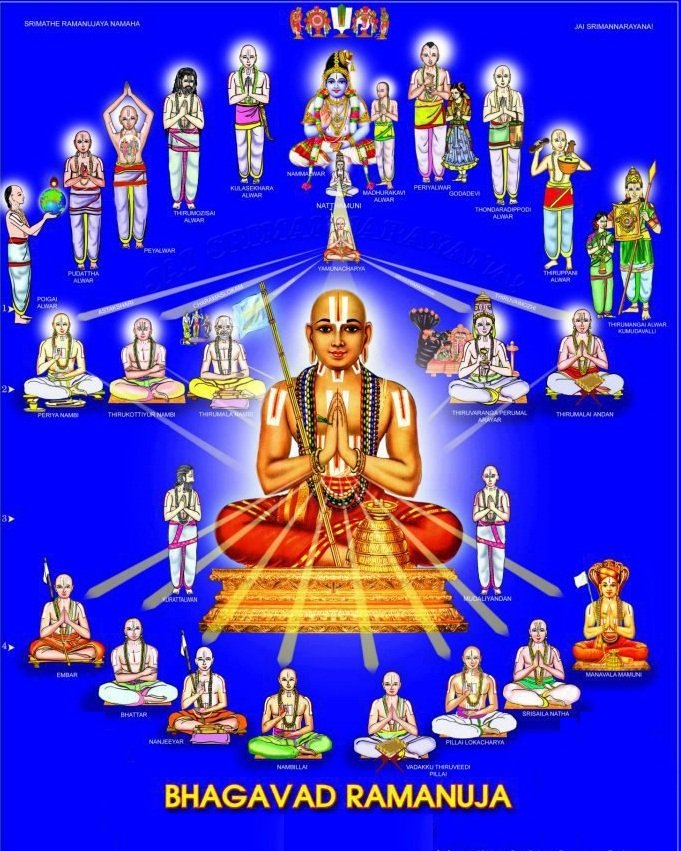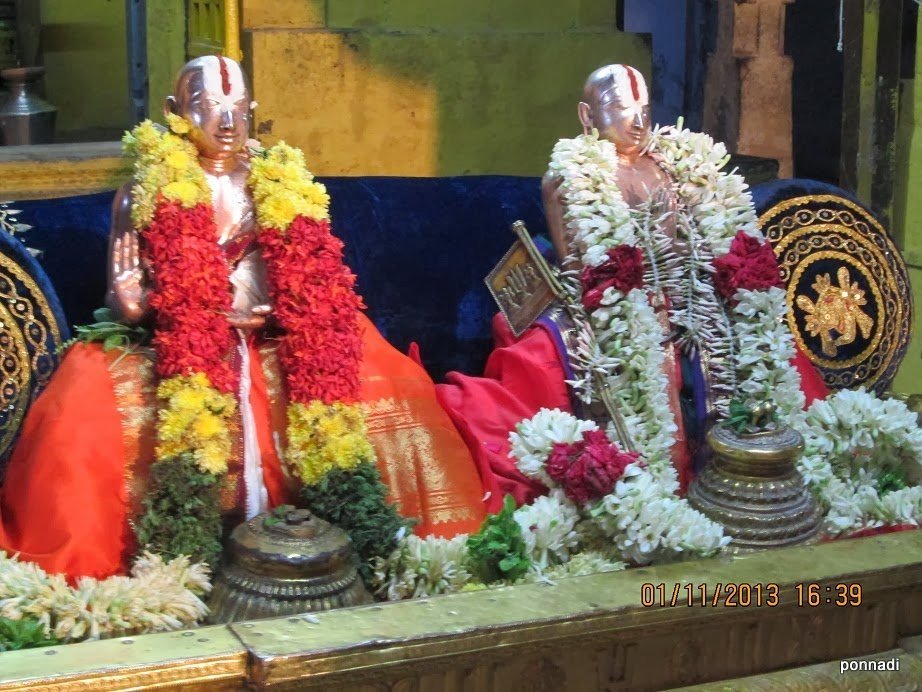We are in the midst of enjoying the divine glories of AzhwArs/AchAryas who appeared in this auspicious month of aippasi. Please view https://granthams.koyil.org/aippasi-thula-masa-anubhavam/ for full glories of this month. We shall now get a glimpse of our most merciful piLLai lOkAchAryar
and his divine work srI vachana bhUshaNam through the most
beautiful vyAkyAna avathArikai (introduction to commentary) of maNavALa mAmunigaL
for this master piece. We have already seen the brief introduction to this glorious prabhandham and its thanians at https://granthams.koyil.org/2013/11/aippasi-anubhavam-pillai-lokacharyar-srivachana-bhushanam-thanians/.
With this background, let us now see the translation of srI vachana bhUshaNam’s wonderful introduction given by mAmunigaL.

thirumanthram is the essence of the whole of vEdham. The three words in thirumanthram reveals the three principles (ananyArha sEshathvam – being subservient to bhagavAn only, ananya sharaNathvam – accepting bhagavAn as the only refuge, ananya bhOgyathvam – accepting bhagavAn as the only enjoyable aspect and is also explained as being an object of pleasure for bhagavAn only). These 3 principles are common for all jIvAthmAs. As mentioned in “yathra rshaya: prathama jAyE purANA:” (, even though all jIvAthmAs have the necessary qualification to be in paramapadham (which is fully pure) where every one’s knowledge is fully blossomed/expanded, where there is eternal bliss which is derived out of constant engagement in bhagavAn‘s names, forms, qualities, etc., as said in “anAdhi mAyayA suptha:” (being covered by ignorance since time immemorial) and “thila thailavath dhAru vahnivath” (seemingly inseparable from matter like oil inside sesame and fire inside wood), jIvAthmAs (bound souls) being covered with the beginningless mAyA (which is controlled by bhagavAn) that covers the knowledge and due to beginningless ignorance which leads to accumulated and endless karmA (virtues and vices) which leads to countless births in sura (heavenly), nara (human), thiryak (animals) and sthAvara (plants). In every birth, they go through many pitfalls such as dhEhAthmAbimAnam (considering body as the self), svAthanthriyam (considering oneself as independent), anya sEshathvam (serving any one other than bhagavAn) and engage in efforts and results to fit such qualities. Such jIvAthmAs, with the vow to leave emperumAn in whatever possible manner, being greatly averse to bhagavAn who is the ultimate master and the best goal and means for jIvAthmAs. As a result, the jIvAthmA goes through the seven stages namely garbha (being in the womb), janma (taking birth), bhAlya (being a child who cannot take care of himself), yauvana (youth which is fully focussed on sense enjoyment), vArdhaka (old age), maraNa (death) and naraka (life in hellish planets) which lead to eternal and endless sorrows. Among those suffering souls, for a few who accepts the grace of bhagavAn which is given at the time of birth which subdues the rajO (passion) and thamO (ignorance) guNams (qualities) and sathvam (goodness) raises and the desire for mOksham (eternal upliftment) develops.
- When one desires for mOksham, they have to understand thathvam (the nature of jIvAthmA being subservient to bhagavAn), hitham (the means) and purushArtham (goal) to be uplifted.
- When trying to understand these 3 principles through sAsthram (which is the primary source for this knowledge), vEdham which is the chief among sAsthrams is pursued. But, as mentioned in “ananthA vai vEdhA:“, vEdham is end less. And to determine any principle from vEdham, one has to use certain methods such as “sarva shAkA prathyaya nyAyam” (determining the principle by going through various sections of vEdham to ensure perfect understanding), etc. All these are too difficult for people of limited intelligence.
- Considering understanding the true principles from vEdham is too difficult, the next source is to go to the rishis (sages) such as vyAsa, etc., who have mastered the vEdham out of their own great efforts and compiled smrthi, ithihAsas and purANas. But in these, only capable persons will be able to distinguish between the essence and extraneous aspects.
- bhagavAn who most mercifully accepts the role of an AchAryan and reveals the rahasya thrayam (thirumanthram, dhvayam, charama slOkam) for the upliftment of all jIvAthmAs. But those are too short and great meanings that are present in them are difficult to grasp for everyone.
- AzhwArs (paraAngusa, parakAla, etc) who were divinely blessed with blemishless knowledge by bhagavAn himself out of his causeless mercy, understood the essence of the whole vEdham and revealed the same in the most precise manner through dhivya prabhandhams which are hailed as dhrAvida vEdham and its angam (part), upAngam (ancillary-part). Yet, people with limited intelligence could not fully understand the real purport of dhivya prabhandhams.

- Seeing that even the ones who have taste for bhagavath vishayam are missing out on the essence due to their limited intelligence, AchAryas starting with nAthamunigaL who were divinely blessed by the causeless mercy of AzhwArs, who firmly established the sath sampradhAyam, who were expert in all of sAsthram and who were most compassionate, understood the essence of vEdham, etc and explained the same in precise manner so people of less intelligence can also understand the same. They also documented the sath sampradhAyam principles in various granthams.

- Following in their foot steps, piLLai lOkAchAryar out of great compassion towards the suffering souls who are missing out on the wonderful opportunity to serve bhagavAn directly and eternally, for the upliftment of such souls, compiled many prabhandhams. These principles were transmitted through the AchArya paramparai. pUrvAchAryas, seeing the most valuable nature of the principles, taught this in a confidential manner to sishyas. Seeing the most glorious nature of the principles, they did not reveal them in public. But, piLLai lOkAchAryar, observing the fate of the future generation who may miss out on these valuable principles, out of his great compassion and based on the desire/orders of bhagavAn himself through svapnam (dream), reveals the most important principles through this grantham named srI vachana bhUshaNam.


adiyen sarathy ramanuja dasan
archived in https://granthams.koyil.org, also visit https://acharyas.koyil.org, https://sriperumbuthur.blogspot.com
swami
awaiting further instalments……especially with Maamunivan vyaakhyaanam……dasan
In Hindi: https://granthams.koyil.org/2016/01/03/thula-anubhavam-pillai-lokacharyar-sri-vachana-bhushanam-1-hindi/
Respected swamy
am happyto read srivachana booshanam in tamil. can you please guide me to get the tamil version of vyagyanam
Dhanyosme
Rukmani
Please try in SrIvaishNavaSrI (chennai/srirangam) or puththUr press (puththur agraharam). It is available there.
adiyen sarathy ramanuja dasan
In thamizh – https://granthams.koyil.org/2017/12/19/aippasi-anubhavam-pillai-lokacharyar-sri-vachana-bhushanam-1-tamil/